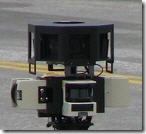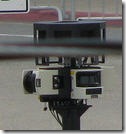Picture of a Google StreetView car pulled over by a cop in San Francisco. (from Flickr).
What is interesting is that it gives us a close up look at laser sensors that Google has added to its StreetView sensor platform.
I had written about the new laser sensors that were first seen on Google cars trolling the streets of Europe (Google collecting 3D data). This platform looks identical to the one spotted in Milan.
With the new angles that these images provide - it looks like there are 4 SICK laser sensors mounted on this platform. Two that are oriented to scan vertically and pointed to look on either side of the car and the other two facing front and back of the car are oriented to scan horizontally.
This is different from the setup that Zakhor and Frueh used, where they had two SICK lasers facing the same direction, with one scanning horizontally and the other scanning vertically.
(from http://www-video.eecs.berkeley.edu/papers/frueh/siggraph2003.pdf, the image on the right shows the 2 scanners oriented so that one is capturing vertically - red and other horizontally - peach)
Here is another vehicle developed by a Japanese university that uses 3 scanners. (link)
Here is a great article on the SICK laser with pictures of what the inards of this gadget look like (Link).
And here is what it does
This is a time-of-flight type LIDAR, which means that it literally uses the speed of light to measure distance. A laser sends out a pulse of light, and a timer is started. The timer stops when the pulse's reflection is detected. Distance is simply T/2C, where T is the timer delay and C is the speed of light. If you rotate the entire optical assembly (or just a mirror in this case), you get very detailed polar range data.
Finally, here is some more information on the SICK laser (link)
And a project that uses the SICK laser for range detection using Microsoft's Robotics Studio (link)








No comments:
Post a Comment